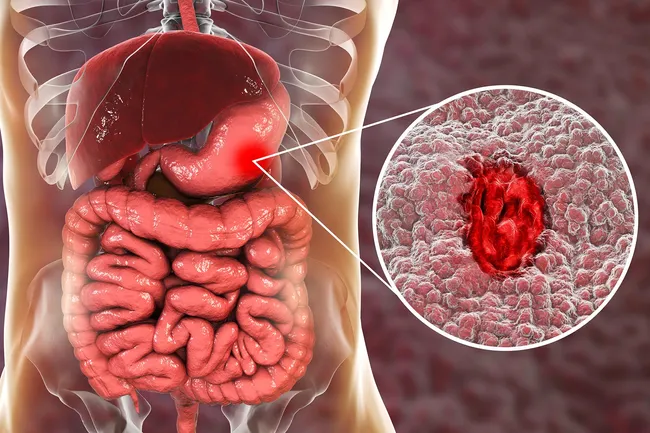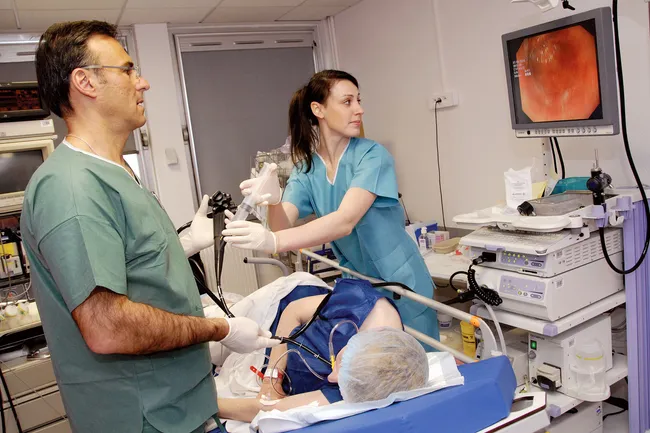Signs You May Have a Stomach Ulcer

What Is an Ulcer?
When your stomach's healthy, it's coated in a layer of sticky mucus. This protects it from the harsh acid that breaks down your food. If something upsets this balance, you end up with more stomach acid and not enough mucus. Over time, that acid gnaws away at the tissue that lines your stomach. The painful and sometimes bloody open sore it causes is called an ulcer. Some are tiny, while others are over an inch long.
Swipe to advance

2
/
15
Blame It on a Germ
The most frequent cause of ulcers isn't stress or super-spicy food. Those only make the problem worse. A bacteria in your gut called Helicobacter pylori (H. pylori) is often the culprit. It inflames your stomach wall until an ulcer forms. It's not yet clear how you get this bug. It may be spread through close contact, like kissing, or through tainted food or drink. By age 60, about half of all people have been infected.
Swipe to advance

3
/
15
Why Painkillers Can Cause Trouble
You could develop an ulcer if you're a regular user of some over-the-counter pain relievers like aspirin, ibuprofen, ketoprofen, or naproxen. When you take these nonsteroidal anti-inflammatory drugs (NSAIDs) too often or for a long time, they inflame the lining of your stomach. Your ulcers won't have a chance to heal until you stop taking them.
Swipe to advance

4
/
15
Medicines That May Lead to Ulcers
| Some medications, when you take them at the same time as NSAIDs, can set the stage for an ulcer. Steroids and blood thinners can be tough on your stomach. So are some drugs that help treat the bone-thinning condition called osteoporosis, such as alendronate (Fosamax) and risedronate (Actonel). |
Swipe to advance

5
/
15
Could It Be Cancer?
It's rare, but sometimes tumors cause stomach ulcers. If you have something called Zollinger-Ellison Syndrome (ZES), it means one or more growths called gastrinomas form in your small intestine and pancreas. These tumors release hormones that force your stomach to churn out more acid than normal, which leads to ulcers.
Gastrinomas do not always mean you have cancer. They can be benign (harmless) and may not spread.
Swipe to advance

6
/
15
What the Pain Feels Like
| When your ulcer is acting up, it's hard to ignore. You'll get burning pain between your breastbone and belly button. It may last a few minutes, or you could have it for hours. The problem may also get worse between meals, when you don't have any food in your stomach. It could even wake you up at night. |
Swipe to advance

7
/
15
Symptoms Besides Pain
You may get a queasy feeling or a need to throw up. You could burp more than normal or feel bloated. You may also have black stools or see blood when you poop. Some people with stomach ulcers don't feel like eating and lose weight without trying. On the other hand, nearly three-fourths of people with ulcers have zero symptoms.
Swipe to advance

8
/
15
Tests You Might Get
If your doctor thinks you have an ulcer, a test of your breath or stool can check to see if you have the H. pylori germ. A stomach X-ray -- or what's called a "barium swallow" -- will look for any sign of ulcers. At the lab, you'll be asked to drink a thick, white liquid that coats your stomach. This makes ulcers easy to spot on the X-ray image.
Swipe to advance

9
/
15
A Closer Look With an Endoscopy
This procedure lets your doctor see any ulcers and take a tissue sample, which can be tested for H. pylori. The doctor gives you medicine to make you feel sleepy, then puts a skinny tube with a tiny camera down your throat and into your stomach. Your doctor is likely to suggest this test if you're older, have signs of bleeding, or find it hard to swallow, eat, or keep on enough weight.
Swipe to advance

10
/
15
Treatments That Target Stomach Acid
How your doctor treats your ulcer depends on its cause. Several types of drugs can cut the amount of acid in your stomach. They also coat your stomach to protect your ulcer so it has a chance to heal. Your doctor may suggest you take an over-the-counter antacid to get some quicker short-term relief.
Swipe to advance

11
/
15
Antibiotics
You'll need to take them if your ulcer is due to H. pylori. These medications cure most ulcers caused by this bacteria, but it can be tough to get rid of H. pylori once and for all. Your doctor may give you as many as four drugs that you'll take for up to 2 weeks. For them to work, follow your doctor's exact instructions. It's also important to finish all the medicine he gives you.
Swipe to advance

12
/
15
Don't Ignore Your Ulcer
There are lots of good reasons to get help. If you put off treatment, your ulcer may start to block food from moving smoothly through your digestive system. You may often throw up or feel too full to eat. Over time, your ulcer could make a hole through your stomach lining and put you at risk of a severe infection. An ulcer that bleeds can also land you in the hospital.
Swipe to advance

13
/
15
Soothe Your Stomach
Easy changes to a few habits can help your ulcer heal. For starters, get a better handle on your stress. When you worry, your symptoms will get worse. Get enough rest and avoid alcohol and tobacco. Eat a healthy diet full of fruits and veggies. Cut back on dairy and fatty and spicy foods, since they can make your belly hurt. You may want to try foods with probiotics ("good" bacteria) like kefir, miso, and sauerkraut.
Swipe to advance

14
/
15
Play It Safe With Pain Relief
Avoid NSAIDs during treatment and afterward. If you still use them, your ulcer may not heal or could go away and then come back. To ease pain, try acetaminophen, which is easier on your stomach. Your doctor can also prescribe a pain reliever that's gentle on your stomach. If you must have an NSAID, take the smallest dose that still helps you, and swallow it with food.
Swipe to advance

15
/
15
Give Yourself Time to Heal
Stomach ulcers often respond well to treatment and sometimes heal within weeks. Your doctor may want to do another H. pylori test or endoscopy to make sure. An ulcer that doesn't clear up could be due to many reasons, from not taking your drugs the right way or another health problem like Crohn's disease. Be patient. Your doctor will gather more info about your symptoms and try other treatments to get your stomach feeling better.
Swipe to advance
- Get link
- X
- Other Apps